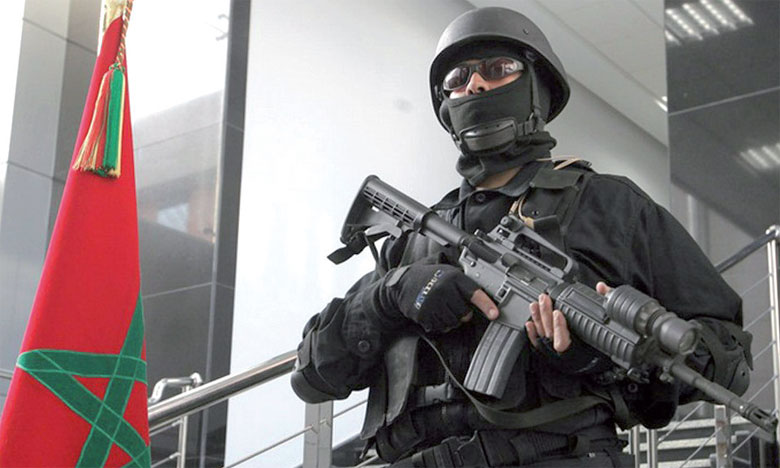Morocco Foils Extremely Dangerous Terrorist Plan Instigated by Senior ISIS Leader in Sahel Region
Rabat – Morocco’s Central Bureau of Judicial Investigation (BCIJ) successfully thwarted, on Wednesday morning, on the basis of precise information provided by the General Directorate for Territorial Surveillance (DGST), a highly dangerous terrorist plot targeting Morocco, commissioned and instigated directly by a senior ISIS leader in the Sahel region of Africa.
This operation was conducted simultaneously in the cities of Laayoune, Casablanca, Fez, Taounate, Tangier, Azemmour, Jersif, Oulad Tayma and Tamsna, in the suburbs of Rabat, and resulted in the arrest of 12 extremists aged between 18 and 40 years, who pledged allegiance to the ISIS terrorist organization and were involved in preparing and coordinating perilous terrorist projects, according to a press release from DGSN-DGST hub. The intervention and raid operations were supervised by members of the DGST’s special force, who enforced the security protocol for serious terrorist threats, the same source adds, noting that sniper teams were deployed at the various intervention sites to neutralize all risks and potential violent resistance. Climbing teams, explosives detection technicians were also deployed, as well as police dog-handling teams specialized in surveying and combing crime scenes suspected of having explosive materials and objects. Simultaneously, policewomen and policemen from the BCIJ evacuated the residents of apartments nearby the intervention sites, in order to ensure their safety and security and as a precautionary measure, the press release adds. During these simultaneous security interventions, the special forces also used stun grenades as a preemptive measure to prevent members of this terrorist cell from engaging in any form of violent resistance or non-compliance likely to jeopardize the security and safety of the intervention team. Following the intervention operations, which culminated in the neutralization of the threat and the arrest of the suspects, the brigadier generals and officers of the BCIJ proceeded with searching the houses of the members of this terrorist cell. This resulted in the seizure of explosive objects in the process of assembly at the house of the two suspects in Tamsna, consisting of four altered gas bottles containing nails and chemicals, plugged to pipes and electrical wires, all connected to mobile phones for remote detonation. A suspicious device, a pressure cooker containing nails and chemicals used in the manufacture of explosives, as well as several bladed weapons of various sizes, a sum of money in US dollars, and several bags containing suspicious chemicals were also found inside the suspects’ house in the Tamsna area. The ongoing searches also uncovered remote viewing binoculars, two imitation firearms, digital supports and electronic devices, a mask used to hide identification data, a wall drawing with the ISIS logo, as well as paper manuscripts containing detailed mapping of some targeted sites and facilities. Intelligence information, supported by the field investigations conducted thus far, shows that the members of this terrorist cell were linked to a senior ISIS leader in the Sahel region, in charge of the so-called “external operations” committee tasked with internationalizing terrorist projects outside the Sahel region south of the Sahara, who oversaw the financing and logistical support, and further provided members of this cell with digital content explaining the modus operandi of these terrorist operations. The investigations also unveiled that this terrorist cell adopted a precise organizational method, under instructions of the same ISIS leader, where terrorist plans were addressed exclusively to the team of “coordinators” who were, in turn, in charge of sending these plans to other members either directly or through indirect channels. Then, the plans are communicated to the team of those “involved” in carrying out terrorist operations, as well as to the branch in charge of support and financing, which directly receives financial payments from ISIS without going through banks. As for the imminent terrorist projects identified by the ISIS Sahel branch assigned to the members of this terrorist cell, they include targeting members of the public force by luring and kidnapping them, eliminating them and desecrating their bodies; targeting sensitive economic and security facilities and foreign interests in Morocco; as well as committing terrorist acts affecting the environment by deliberately setting fires. Security investigations show that members of this terrorist cell recently conducted field operations to identify target sites in several Moroccan cities, the source notes. They also received the “blessing” of the ISIS organization in the Sahel for their terrorist project, as they obtained a tape blessing and inciting them to carry out this operation, thus greenlighting their transition to the physical implementation of the subversive actions. For the purposes of the investigation carried out by the BCIJ under the supervision of the public prosecutor’s office in charge of terrorism cases, all those arrested in connection with this terrorist cell were taken into custody with a view to furthering the investigation, uncovering their links with the African branch of ISIS in the Sahel region, and identifying all the connections at national and international level of this terrorist cell. This security operation showcases, once again, the resurgence of the terrorist threat in the form of the branches and regional hubs of ISIS in Africa, particularly in the Sahel region, in view of this organization’s resolve to export its terrorist operations to several regions of the world, including Morocco. DGST services had alerted international and regional security partners to the heightened risks and challenges posed by terrorist threats in the Sahel region of Africa, following the dismantling in recent years of numerous extremist cells pledging so-called allegiance to the “emirs” of the Al-qaeda and ISIS organizations in the Sahel and Sahara. The terrorist plots of these extremist cells have been endorsed by these “emirs”, who have provided them with the necessary financial and logistical support, in addition to promises to provide them with safe havens should they execute their terrorist plans.

